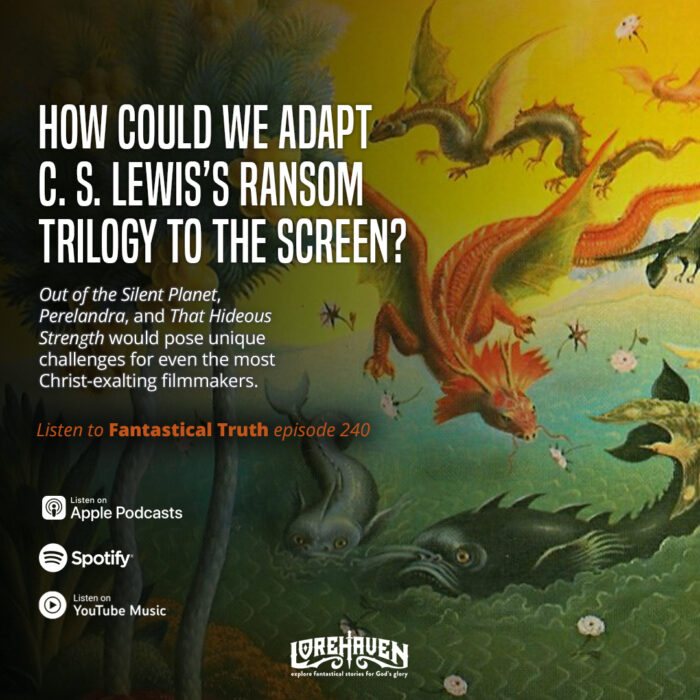Should Christian Stories Evangelize? Chapter 3
 From part 2 of the series:
From part 2 of the series:
At its onset, the gospel’s transmitted through words. And, like you said, Stephen, we tend to look at written fiction, comprised as it is of words, and have a difficult time parsing its highest purpose from that of the persuasive work of the evangelist. Automobile repair is easier to isolate, because it so little resembles “full-time Christian ministry.” But writing? Writing exists in the realm of ideas. It has the capacity to shift psychological stasis and alter human behavior — to reshape our view of the world. With this in mind, should Christian fiction really “make the most of every opportunity” to proclaim Christian doctrine and normalize Christian practice?1
E. Stephen Burnett: Beyond excellent work into excellent leisure
Austin, thanks for that excellent overview of the oft-ignored doctrine of Christian vocation. It’s a reminder to many of us—that the Bible has a lot more to say about our topic than “evangelism is the most spiritual task you can do, so don’t waste any opportunity to do it.”
But in response to this overreach, many Christians may overcorrect into an equally blind spot. They assume the Bible has little to say about non-explicitly-religious work.
As you pointed out, Scripture gives plenty of commands about the goodness of all work. The book of Proverbs alone is sufficient to give general principles about God-exalting character and behavior in all areas of life. These include traits like honesty, justice-seeking, and the truth that excellence typically brings worthy recognition. For instance:
Do you see a man skillful in his work?
He will stand before kings;
he will not stand before obscure men.2
But that brings to mind a few more questions about the purpose of “whatever [Christians] do … for the Lord”3 even before we speak more of stories’ purpose.
For instance:
1. We may speak of storytelling as ‘work,’ but what about our leisure time?
 Readers may know that I try to push back against an impulse to speak more about “the fiction industry.” Alas, that has potentially created the impression among some that I would rather never talk about things like a story’s plot, dialogue, and originality.
Readers may know that I try to push back against an impulse to speak more about “the fiction industry.” Alas, that has potentially created the impression among some that I would rather never talk about things like a story’s plot, dialogue, and originality.
Not at all! Instead I’m trying to get away from a kind of metal-and-wheels “usable tool” pragmatism. Surely anyone is subject to that—at least, I certainly am. This is the difference between hearing a concert while knowing good music and thus enjoying or critiquing it more, and listening to the concert primarily so you can think about how you’re going to make your own music someday. Before we prepare to use, let us be prepared to enjoy.
But good enjoying sounds so, well, lazy. And non-productive. And not very evangelistic.
I can’t help thinking of the satirical bumper sticker that says, “Jesus is coming / Look busy!”

We may have an image, and we may smile or laugh about it, but the image may still haunt us. It’s an image of Jesus bursting out of the clouds, victorious and ready to bring Heaven to Earth, only to find us not specifically waiting for Him. Instead we’re sleeping, showering, toilet-using, spouse-canoodling, or doing anything that is not an explicitly spiritual activity.
What if Jesus returns and finds us, say, not working but doing something restful such as enjoying a story? Would that be okay? What it be okay if the story had no explicit invitations to salvation?
We likely both agree that in that event, Jesus would not fault us for anything. Even if He caught one of His children sinning, that sin would be covered by His blood. A Christian resurrected out of sleep or any other leisure by the Second Coming/resurrection is no less “spiritual” than a Christian resurrected out of the very act of preaching at a pulpit.
2. Is it okay for Christians to take a “break” from explicit gospel work?
Austin, you mentioned another image Christians have, the image of a “full-time missionary.” But even this popular conception is flawed because no one in ministry actually does it full-time. One missionary couple supported by our church will spend years learning a language, and supporting their family while having more children and homeschooling them. How unspiritual! And on occasion they might check their email, read a novel, watch TV, or at least spend time sleeping. Even this isn’t full-time ministry by our subconscious standards.
These leisure activities, though small, can also glorify God. It depends on whether we do it “from faith,” defined according to Scripture. Whether we eat, drink, or anything, “whatever does not proceed from faith is sin”4—a short yet immense definition.
Even Jesus did not engage in “full-time ministry,” but would “withdraw to desolate places and pray”5 and visit friends such as Mary, Martha, and Lazarus in Bethany.
We still have Sabbath rest, times when we retreat, recharge, and fulfill human needs.
Yet that rest is part of our goal of evangelizing people, preparing us for an eternal Sabbath.
Evangelism is bigger than John 3:16
Now let’s return to the definition of evangelism. In chapter 1, I said that evangelism means “using words to communicate the good news of Jesus and the coming Kingdom.” This must include an introductory call to repent and believe in Jesus and be saved—perhaps a “John 3:16 call” made famous by Western evangelists and local church revivals. But is evangelism limited to this call? No. Evangelism must be nothing less than this call. But it’s much bigger.
For the Christian, “evangelism”—that is, “gospel-izing” the world—gets deeper, brighter, and more epic than, well, a mere piece of “evangelism” that’s a specific call to be saved.
Evangelism starts with “Repent and be saved.” By no means does evangelism end there.
As you pointed out, Austin, Jesus’s Great Commission command can best be phrased “As you are going, disciple people.” Shall we reduce “disciple” to the initial call to “repent and become a disciple?” Not at all. That’s just the start of discipleship, a lifetime mission.
Thus, should Christian stories evangelize? Our answers must start with, “It depends on …”
Then our answers must begin exploring the author’s maturity and goals, the audience’s needs, and especially the fact that a reader’s “discipling process” while enjoying a story—with or without explicit biblical images or themes—will almost always look very different.
For instance, we might return to a fact you and I mentioned earlier, the fact that neither of us have been “saved” according to some standard evangelical methods of “evangelism.” Some may prefer the standard “John 3:16” faith “pickup line.” But God works differently in different people’s lives, not only to build people’s faith before they are saved but after.
I’m curious: How did Jesus work in your own life to summon you to the Kingdom?
How does he work in stories, including fantastical stories by Christian and non-Christian makers that may not seem to be limited to the standard-issue “evangelism”? And how does that compare with the popular conception of “evangelism” in faith and Christian stories?
Should Christian stories evangelize?
This is a crucial issue for anyone who loves stories but loves Jesus more, and wants to glorify Jesus through our enjoyment of stories or our making of stories.
During October our new SpecFaith series explores this issue.
On Thursdays, reviewer Austin Gunderson and writer E. Stephen Burnett host the conversation with interactive articles. On Fridays and Tuesdays, guest writers such as novelists and publishers offer their responses to the question.
We invite you to give your own answers to the #StoryEvangelism conversation.











































Being both fanatically obsessive and deeply introspective is not a good combination for having any sense of assurance about salvation. I guess I still blame “American Evangelicalism” for allowing me to believe as a child that saying The Prayer right mattered. I don’t remember whatever first time I said one of those prayers as a child, only the hundreds of times that I compulsively prayed different prayers from different tracts, trying to examine and re-examine my thoughts and motives at the same time. But I haven’t believed that I was “saved” as a young child for many years — at least since I had a big faith crisis when I was 17. If I’m saved at all, then God hasn’t given me the knowledge of when and how I entered this state of salvation in this life on this world—and He doesn’t have to give me that assurance, because my way of experiencing God might be different from someone else’s. My “testimony” doesn’t include a definitive “saved” moment, and I won’t participate in any ministry that forces me to pretend that it does.
Paul, this is why I find what has been called “the doctrines of grace” not only so biblical but so comforting. It emphasizes the sovereignty of God in salvation. He is the one who began the good work of salvation in His people, and He is the one Who will be faithful to complete it (Phil. 1:6). And it also de-emphasizes the traditional evangelical emphasis on an obvious, black-and-white “salvation experience.” (This can be corrupted into a denial of the boundary between “saved and not saved.” But it need not be so corrupted.)
This truth does not rule out “testing yourself to see if you are still in the faith” (2 Cor. 13:5). But this truth does put it in perspective. And it helps counter a limitless self-doubting that can occur among anxious Christians.
(And I will assure you, all of us struggle with faith and salvation doubts. Yet Wise Christian teachers have said the struggle itself helps confirm true faith. Why would we care about being saved if God Himself were not giving us that desire to be saved, to reject sin and be reconciled to Him through Jesus?)
When I was at college, one of my professors shared that while some people have ‘flash’ conversions, it can also be a process. And if it turns out when we get to heaven and discover that it happened later than we thought (ie, 12 instead of 8), oh well. I found that very, very, encouraging.
The discipling portion of the Great Commission is neglected. I don’t think any believer would say that new believers should be ignored completely. But in practice, the discipling portion–Sunday school, small group, etc–is dismissed as in-work, not a critical part of evangelism.
Interesting! I was not raised in a Christian home, and although that is a considerable source of sadness for me, I have to confess I am kinda glad at times I was not. I grew up in a home that loved the arts, whose parents loved to read and read widely. I became a Christian as a young teen and right about that time, the movie “Jesus Christ Superstar” came out. I was absolutely thrilled to see Jesus on the big screen, and I loved the music. I saw that movie numerous times that summer, and it had an incredibly encouraging effect on my faith. It is still one of my favourite movies. As I look at it now, yes, I see all sorts of theological “issues” with it, and I imagine that at the time the Christian community was not happy with it, and probably discouraged their members from seeing it. Thankfully I was blissfully unaware of that, and God used that movie to bring me closer to Him. I often think about this when I encounter other book/films that Christians slam because they are not completely theologically correct. God can use anything to bring people to Him and to disciple His people, even theologically “off” stories. That doesn’t mean that we shouldn’t point out errors when we see them, but perhaps we need to be slightly less “freaked out” by them. In a more recent example, I loved the Noah movie, for many reasons, and God used it to deepen my faith and make me think about some things I hadn’t thought of before. I get why some people didn’t like the movie, but let’s not make these things the standard by which we judge other people’s faith or maturity if they do/do not go to a certain movie (or read a certain book) that “we” think might be slightly suspect.